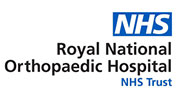Donate tissue
Over the last few years, Professor Adrienne Flanagan’s research team and colleagues have used tumours from patients treated at RNOH (Royal National Orthopaedic Hospital - with their consent and ethical approval), to make 3 chordoma cell lines.
These and 3 other cell lines that have been generously donated from other researchers are being used to screen 1000 drugs / compounds with the aim of finding a treatment for this disease. Some of these drugs are already used in the treatment of other tumours, some of which are in development.
Dr Tim Forshew has recently joined UCL Cancer Institute using his expertise to measure small amounts of the DNA thrown out of the tumour into the blood stream. With Professor Flanagan he is trying to develop a blood test to monitor patients with this tumour. This is important as the disease recurs in many patients and the sooner that this can be detected the better for the patient. Chordoma UK has donated £20,000.00 ($34,000.00) towards the equipment (a digital PCR machine).
How can patients with chordoma help in the research?
Access to chordoma samples is critical for research into this disease: However, access to chordoma samples is a rate limiting step in research, this is particularly the case as it is such a rare disease, occurring in only 1 in 800,000 of the population. If you have had a chordoma removed in the past, or if you are about to have a chordoma surgery in the future, it would be most valuable - indeed essential for the research team to have access to some of your tumour. Researchers would only use the sample if it were surplus to clinical/diagnostic requirements, and if there was the appropriate ethical approval and consent. Professor Flanagan’s goal is to create a collection of 500 chordoma samples to undertake the analysis of the DNA in these samples. Alterations in the DNA is what makes tumours grow in an uncontrolled manner. Such a large scale study will provide useful information about what makes chordoma grow, and this may lead to ideas about how new treatments for the disease could be developed.
So if you, a family member or friend have a chordoma and are due to undergo resection of a chordoma tumour at any time, please discuss this initiative and consider allowing the research team access to a sample of the tumour.
If you would like more information we can arrange for you to be put in contact with Professor Flanagan’s team. You can find the Patient Information Sheet and the Consent Form on the Royal National Orthopaedic Hospital’s Website.
 Get in touch
Get in touch Want to make a donation?
You are the reason we can keep providing our vital supprt and funding. Individual donations and gifts may be made directly to Chordoma UK and enhanced through GIFT AID. Your fundraising can benefit from Chordoma UK`s charitable status enabling donations to be made through the Gift Aid scheme directly to the Chordoma UK bank account.
Donate nowJoin our Mailing List
Please sign up to receive our newsletter and follow our ongoing updates and events.
How your donation is spent
There is little funding available for research into this relentless bone cancer mainly because it is relatively rare, occurring in only 1 in 800,000 of the population. Without a focused approach to raising money for research into chordoma, little will change quickly.
Find out moreGet in touch
If you have any questions about Chordoma UK, or would like to talk to someone about cancer, send us an email and we'll get back to you as soon as we can.
Contact usCommunity
We all support each other
To share experiences, ask questions or vent your emotions and find others who understand.
Join us here






